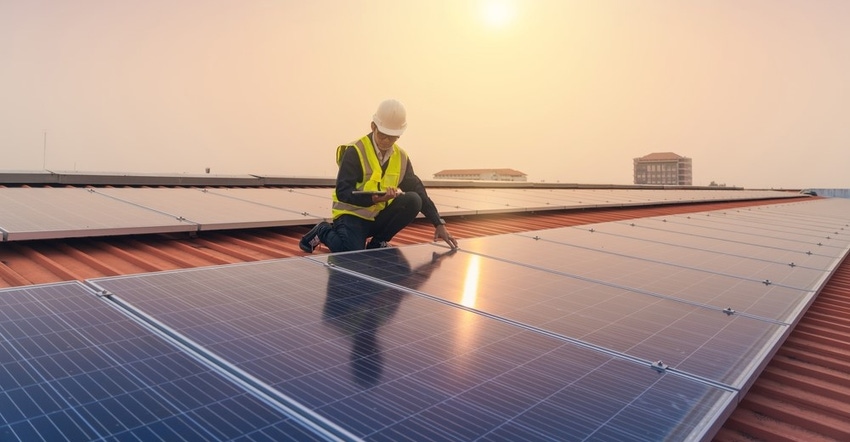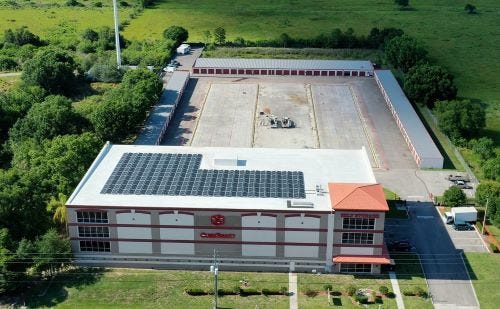Installing Solar Panels at Your Self-Storage Facility: Benefits, Costs and System Maintenance
Self-storage buildings have vast roofs, which makes them ideal for solar panels. If you’re thinking about adding them at your facility, learn the primary benefits and what to expect from an installation, plus financial factors to keep in mind. The author also shares insight to maintaining the system.

As the world faces rising energy costs and a growing concern for environmental sustainability, an increasing number of self-storage businesses are turning to solar power. With their ample roof space, these facilities present the perfect opportunity for panel installation. In fact, as the solar industry grows, more and more individuals and organizations will embrace this energy source to contribute to a greener future. Let’s look at some of the benefits, financial factors to consider and how to maintain a system.
Primary Benefits
An investment in solar energy showcases your self-storage company’s commitment to sustainability, appealing to eco-conscious customers and enhancing your business reputation. Customers value companies that show care and concern for the environment. This initiative not only helps reduce a property’s carbon footprint, it aligns with the growing global movement toward clean and renewable energy sources. But that’s just one ray of sunshine.
A successful installation can also lead to decreased utility expenses, which is a major win. With electricity costs being unpredictable and likely to increase in the years ahead, the transition to solar as a fixed energy source can give you peace of mind, as it shields your self-storage business from fluctuations in utility rates. Owners can expect to save more than 40% on electricity, and these lower costs result in higher net operating income. Research also indicates that self-storage facilities with solar-panel systems typically have higher appraised values.
Installing solar panels on your self-storage rooftops also allows you to participate in net metering or power-purchase agreements, meaning you sell the excess electricity generated by your system back to the grid. During periods of high energy production, you can earn credits that can be used to offset future energy consumption. The electricity your facility generates can even earn payment from your local utility, providing an additional source of income.
Financing
A chief concern for most self-storage operators who are interested in solar energy is how to finance the system. An installation involves upfront expenses related to equipment, permits and more. While these costs can vary based on size and location, the decreasing price of solar panels and the availability of incentives and rebates often make it a smart economic choice.
What many self-storage owners don’t realize is there are numerous tax incentives, rebates and grants available for those who want to invest in solar. The options depend on your state, however, one that holds true no matter your location is the Investment Tax Credit. This is a significant federal incentive to adopt commercial solar power, and can allow you to stack tax credits starting at 30%.

A 116.20 kW solar-panel system was installed at this CubeSmart-managed
property in Brandon, Florida, to reduce the climate-controlled facility’s
electric bill and generate long-term savings
But before you jump in and invest, you’ll want to determine the financial feasibility of a solar-installation project, including your payback period. This is how long it takes for the savings to equal the initial investment. Several factors affect this, such as system size, local electricity rates, incentives and installation costs. Typically, self-storage facilities see payback in as little as six years. After that, the system keeps generating savings and becomes a dependable long-term investment.
An additional advantage of investing in solar is the tax benefits, specifically bonus depreciation. You can pull forward a majority of the cost in year one to reduce your taxable income, saving you thousands in taxes. To learn more and take advantage of this and any of the above programs, work with a reliable solar developer.
Maintenance
If installed correctly, solar panels are designed to last up to 25 years with minimal upkeep. When it comes to maintenance, very little is required. A cleaning twice a year will suffice, as long as the system isn’t subjected to extreme weather events. Most self-storage operators choose to hire a professional to maintain their system. This will keep your panels performing optimally.
A perk some owners don’t know about is a solar-panel system has a warranty for its projected lifetime, so if anything were to happen to the equipment, it’s covered! Even so, it’s important to monitor the performance of your panels to ensure that they’re producing as expected.
As solar technology continues to advance and the costs of installation decline, its adoption in the self-storage industry is expected to increase. This will further cement its position as a wise choice for facility operators.
Allena McKinley is a business-development representative for ESA, a solar developer that collaborates with business owners nationwide to ensure a smooth transition to clean energy. She works alongside a team of experts who help self-storage owners design and build their solar investment and provide a framework for those seeking to strategically reduce their carbon footprint. To reach her, email [email protected].
About the Author(s)
You May Also Like





